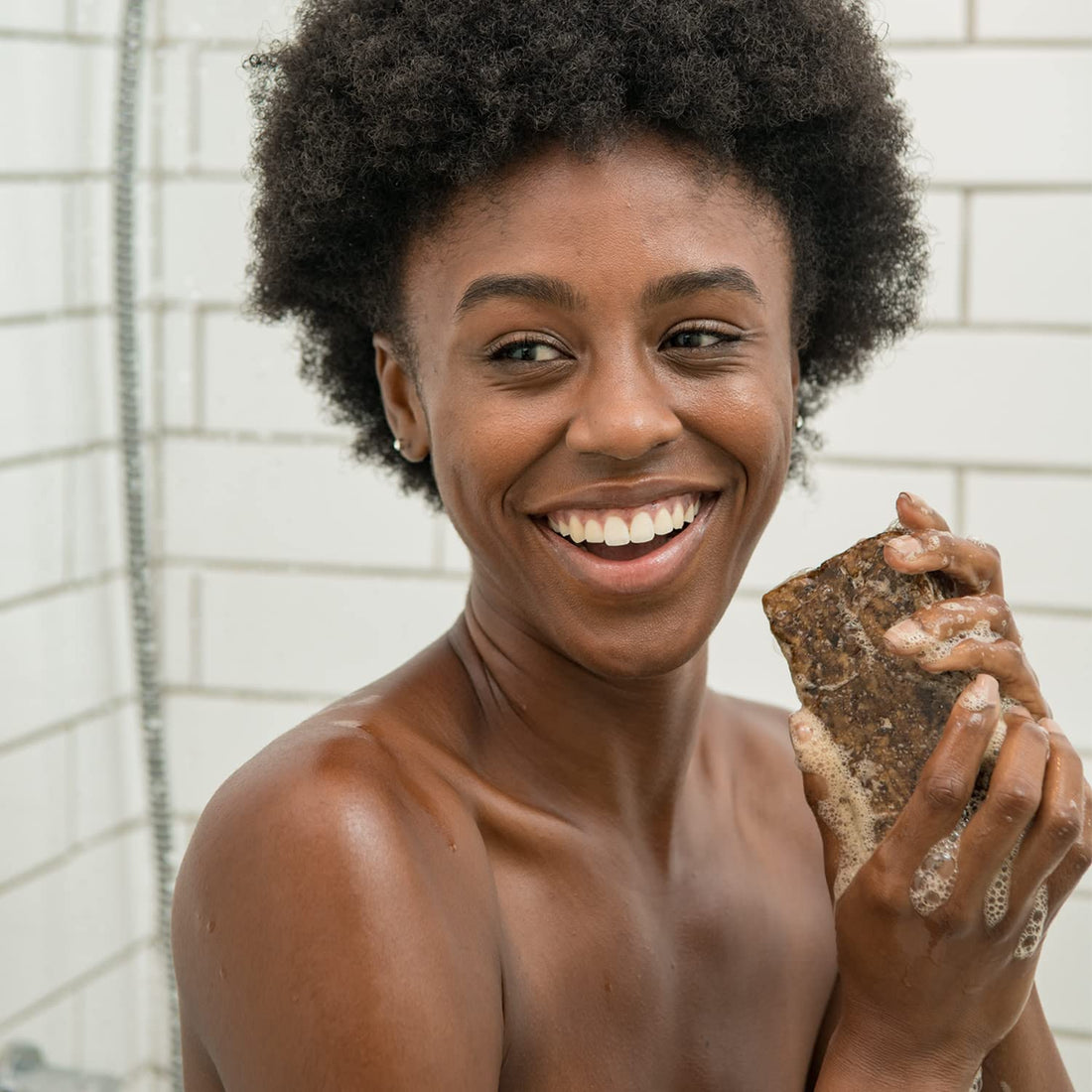
The secrets behind African black soap.
Share
How is it made??
African black soap is traditionally made by women in West Africa, in countries such as Ghana. Our African Black Soap is imported from a Fair Trade Village in Africa that supports both woman and children. As different African tribes may have slightly different recipes to their black soap-making, the colour of different soaps may differ, but the foundation of all of these is the same: local plants and their barks are roasted and dried in a pot until they turn to ash. These plants include plantains, which release the saponins to create the soapy and cleansing property when roasted, cocoa pods, palm tree leaves and the bark of the shea tree. Oils such as coconut oil, palm oil, palm kernel oil (sustainably grown and produced on a plantation that is not used on Rain Forest land, our supplier is a member of Roundtable Sustainable Palm Oil) and shea butter are then added to the ash and stirred for a minimum of one day. Finally, the soap is left for two weeks to cure before it is used.
Black soaps that are made in Africa can be trusted as being 100% pure, while those produced in European or American countries may have artificial
ingredients added to them, and may not be the best choice if you’re seeking a completely natural form of skin or haircare.
What nutrients are found in African black soap?
Black soap contains a myriad of beneficial nutrients that are great for both the hair and skin. These include:
Vitamin A
Helps to control oily skin by inhibiting the sebaceous glands that produce this oil; promotes cell turnover for healthier-looking skin.
Vitamin E
An antioxidant that helps to fight free radicals to keep skin youthful and radiant; repairs damage to hair follicles and reduces inflammation to promote healthy hair growth.
Iron
Gives skin that healthy glow by increasing oxygen circulation in the blood; helps to reduce dark marks and dark circles; helps to bring oxygen and other nutrients to the scalp
Natural fats
The many oils in black soap help to moisturize skin and hair and prevent premature wrinkling of skin.
Cinnamic acid
A compound found in the shea butter in black soap that helps with UV protection for skin and hair.
12 Amazing Benefits of African Black Soap
Black soap’s ability not only as a cleanser but to treat skin/hair conditions makes it extremely versatile. Here are some of the brilliant advantages of using African black soap on hair and skin.
Natural, organic skin cleanser
By using 100% pure black soap made in West Africa, you can rest assured that you’re treating your skin to organic and chemical-free forms of skincare and stepping away from the use of chemicals that may irritate, damage or cause an allergic reaction on your skin. Black soap is the perfect choice for individuals who prefer holistic and all-natural ways of living.
Gently cleanses skin
When used correctly, African black soap is not harsh on skin. It is a much gentler cleanser than many commercial face/body washes sold on the market today that may cause itching and redness when used. Because of this, it is ideal for those with sensitive skin or with skin conditions that are easily irritated.
Deep, powerful cleansing without stripping
Skin’s natural oils are essential to keeping the face and body moisturized and elastic. The antifungal and antibacterial properties in black soap allow for a deep cleansing of the skin’s pores, but due to its high oil and fat content, it does not strip skin of its natural oils like other soaps or face washes.
Acts as a great alternative to commercial shampoos for any hair type
Commercial shampoos strip hair and often leave it feeling dry and straw-like. Black soap, on the other hand, provides the type of cleansing that’s best for hair: making it clean while allowing it to retain its natural oils. This is especially beneficial to curly or kinky hair, as retaining natural oils is more difficult for textured hair.
Can help to treat and reduce acne
African black soap’s antibacterial properties help to fight bacteria that may cause acne on the face, chest or even back. It also inhibits acne by reducing the oiliness of the skin.
Exfoliates skin
Black soap possesses exfoliating qualities due to its ability to promote cell turnover. In addition, this ability to remove dead skin cells also comes from the grainy texture of the soap, which comes from the ash that forms its base. This grainy surface is abrasive, so it helps to manually remove dead skin cells from the face and body.
Can help to fade skin discoloration
The iron in African black soap helps to fade dark marks and skin discoloration on the face and body, giving you a more even, healthy-looking skin tone.
Helps to ease various skin conditions
African black soap has been used to reduce the itching and burning associated with skin conditions such as eczema and psoriasis due to the natural fats present in the soap.
Prevent premature aging
The antioxidants in the vitamin E that is found in black soap help to prevent free radicals from affecting your skin. Vitamin E also helps to keep skin elastic and youthful, keeping wrinkles and sagging at bay.
Reduces irritation and inflammation of skin
Rashes and other minor skin irritations can also be relieved using African black soap.
Helps with the healing of wounds
Theiron in black soap works to improve blood circulation, bringing more oxygen to the surface of your skin to help with skin repair and bacterial defense for the exposed wound. This prevents infection and helps the wound heal more quickly without becoming infected.
Can soothe razor bumps
Razor bumps are a pesky side effect of shaving, but vitamin E’s ability to help skin looking radiant helps to diminish the appearance of razor bumps caused by shaving, while vitamin A assists in cell turnover to produce new, healthy skin cells.
Though African black soap can improve the look and health of skin and hair in many ways, it must be kept in mind that it is extremely potent, and should be used in accordance with certain guidelines in order to reap the best results. Here are a few very important tips on how to use black soap for the best outcome.
Tips
African black soap is so powerful, it isn’t necessary to use a lot when washing your face. Too much of the soap can cause redness and dryness – a marble-sized piece of soap is perfect for your entire face and neck area. When washing your face with African black soap, take the marble-sized piece of soap between your hands and rub them together to create a good lather. Then, apply this lather to your face, hair and body.Caution! Be extra mindful of applying the soap around your eyes and nose. It’s best to rub gently without scrubbing, as these areas are home to thinner skin that is more easily irritated. Persons with a caffeine allergy or sensitivity are advised to do a patch test on their skin before using African black soap, as the cocoa pods in the soap may cause irritation of their skin. Using black soap everyday may be too much for skin to take due to its potency, so it’s recommended that you refrain from doing so. Using the soap 2-3 times a week may be best for your skin, and you’ll still see results!Helpful and lesser-known tips for using African black soap to reduce the potency of black soap while using it, you can dilute the lather with an oil of your choice, such as olive or coconut oil. This not only reduces its power, but also adds an extra burst of moisture to your face to keep it hydrated and radiant. When using black soap to combat acne, the acne may seem to get worse before it gets better. This is called ‘purging,’ and it occurs when the vitamin A in black soap stimulates cell turnover. This causes the shedding of dead skin cells, so you may notice extra dryness, flakiness and whiteheads as the dead cells and toxins are removed from your skin. This purging period may last for up to two weeks, but it does end, so stick it out!Using a good moisturizer after washing your face with black soap is recommended. This helps to combat any possible dryness that may arise, and aids in making your skin glow even more. When using black soap on hair, it may be easier and more convenient to liquefy the soap to make a black soap shampoo. To do this, simply break up your black soap in a mixing bowl and pour boiling water over it to melt it. When it cools, transfer it to the bottle of your choice and voila!
